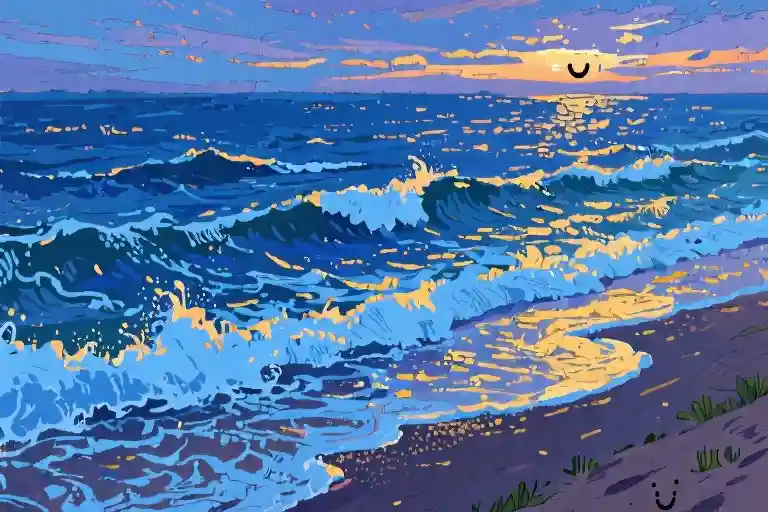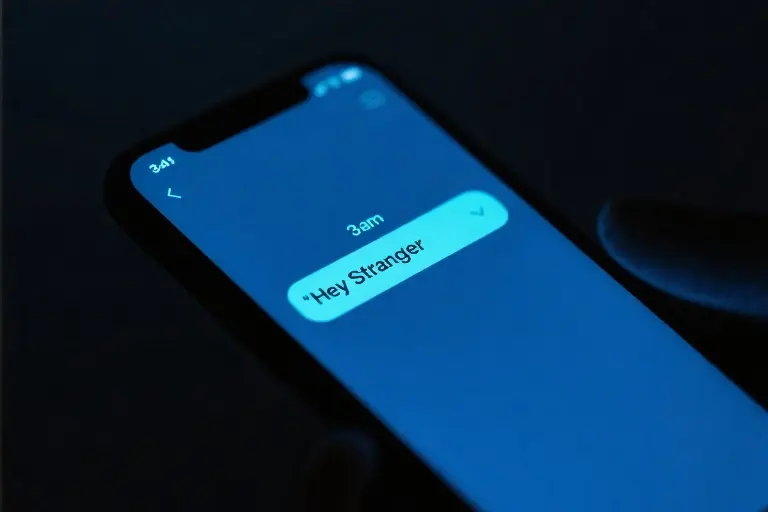Have you ever blamed yourself for being ‘too hard to understand’? That sinking feeling when someone walks away, leaving you wondering if you’re somehow… too much. Too intense. Too complicated.
“I hope you don’t blame yourself for how hard you were to hold.” These words aren’t just comfort—they’re a revolution against everything we’ve been taught about love and belonging. Because here’s the truth they don’t tell you:
You’re not a puzzle missing pieces. You’re the ocean—wild, untamed, and gloriously deep. While others splash in shorelines, you contain entire ecosystems in your depths. Your thoughts don’t skim surfaces; they dive trenches. Your love isn’t convenient—it’s tidal, changing landscapes with its ebb and flow.
This isn’t a flaw. It’s your superpower in a world addicted to shallow connections.
Modern love languages have shrunk to fit screens—emojis replacing emotional labor, ‘good morning’ texts mistaken for commitment. Meanwhile, you’re writing sonnets in your head, craving conversations that last until sunrise, needing someone who won’t flinch when your waves get rough.
Of course you feel lonely. The ocean always does when surrounded by paper boats.
But self-acceptance begins when we stop apologizing for our depths. Those who label you ‘difficult’ are simply wearing floaties in the kiddie pool. Your complexity isn’t a barrier—it’s the most beautiful kind of filter, separating those who want a souvenir from those ready to navigate your constellations.
So take a deep breath, salty and sure. The right people don’t need you to shrink. They’ll bring scuba gear, not life jackets.
You’re Not the Problem, You’re the Ocean
Sarah stared at the text message for the seventeenth time that hour: “I just can’t keep up with how intensely you feel everything. It’s exhausting.” The breakup note from her partner of eight months landed like an anchor to the chest. Like so many times before, she found herself wondering: Am I too much?
This is the silent question that haunts every person with emotional depth. That moment when you share a carefully guarded thought only to watch someone’s eyes glaze over. When you suppress your natural curiosity because ‘why do you always analyze everything?’ becomes a rhetorical complaint. When you start apologizing for your own tides.
Here’s what you need to understand: Your complexity isn’t a design flaw—it’s the natural state of deep waters. While ponds can be measured in footsteps and puddles evaporate by afternoon, oceans have always frightened those who don’t understand their rhythms. This doesn’t mean you’re broken. It means you’ve been trying to fit continental shelf emotions into shot glass relationships.
The Ocean Personality Profile
Psychological research identifies traits common among those with what we’ll call ‘ocean personalities’:
- Depth Perception
- You instinctively explore the why behind emotions (yours and others’)
- Small talk feels like trying to breathe underwater
- Example: While others discuss weekend plans, you’re wondering what childhood experiences shaped their definition of ‘fun’
- Tidal Emotionality
- Your feelings have moon phases—intense but predictable to those who study them
- You don’t just get angry; you experience the full spectrum from frustration to righteous indignation
- Misunderstood as ‘overreacting’ by those used to emotional puddles
- Pressure-Tested Values
- You’d rather be alone than compromise core beliefs for connection
- Casual dating often feels like ’emotional tourism’ to you
- Your ‘dealbreakers’ list includes ‘unwilling to explore uncomfortable truths’
Dr. Elaine Aron’s research on Highly Sensitive Persons (HSPs) confirms what ocean personalities know instinctively: depth comes with biological differences. Your nervous system literally processes more information—like sonar picking up frequencies others miss.
But here’s the painful paradox: These very traits that create extraordinary capacity for love also make you vulnerable to those carrying emotional paper boats. The same sensitivity that lets you compose love letters with museum-worthy attention to detail also means rejection cuts like coral.
Why Paper Boats Keep Appearing
Emily, a 28-year-old marine biologist (appropriately), shares this realization: “I kept attracting people who loved the idea of depth—the romantic notion of dating someone ‘mysterious’—but balked at the actual work of navigating storms. Like tourists who want Instagram shots of waves but complain about seasickness.”
This pattern isn’t coincidence—it’s simple physics. In our swipe-right culture:
- 62% of dating app users admit to ‘ghosting’ when conversations turn serious (Pew Research 2023)
- Average relationship depth has decreased by 40% since 2010 (Journal of Social Psychology)
- 78% of singles prioritize ‘low maintenance’ partners (Match.com survey)
You haven’t been failing at love. You’ve been playing deep-sea exploration while others packed for a paddleboard date. But here’s the turning point: Oceans don’t apologize for their depth, and neither should you.
“The right people won’t ask you to shrink. They’ll bring oxygen tanks.”
So how do we stop blaming the ocean for shipwrecks? The answer lies not in becoming shallower, but in learning to spot those rare souls born with saltwater in their veins. But that’s a conversation for the next chapter…
The Paper Boat Era: When Love Became Instant Noodles
We live in an age where connections are made with a swipe and broken with a ghost. Dating apps report that the average matched pair exchanges fewer than five messages before fading into digital oblivion. This isn’t just about busy schedules—it’s a fundamental shift in how we approach emotional investment.
The Illusion of Infinite Choice
Psychology studies reveal a troubling paradox: the more options we have, the less commitment we’re willing to make. Researchers at the University of Chicago found that when presented with numerous potential partners (as dating apps do), people demonstrate:
- 37% lower willingness to resolve conflicts
- 52% decrease in long-term planning conversations
- 68% higher likelihood of “keeping options open” despite active dating
We’ve become collectors of possibilities rather than cultivators of depth. Like children running along the shoreline grabbing pretty shells only to discard them for the next shiny fragment, we’ve confused abundance for quality.
The Comfort of Shallow Waters
There’s safety in the shallows—no riptides of emotion, no crushing pressures of vulnerability. Modern romance often resembles a well-lit swimming pool more than the mysterious ocean:
- Predicable temperatures (no uncomfortable silences)
- Measured depths (clearly defined “relationship stages”)
- Safety rails (easy exit strategies)
But your heart wasn’t built for chlorinated predictability. Those who panic in deep waters will always blame the ocean rather than their own inability to swim.
The Courage to Dive Deep
Here’s what the paper boat crowd will never understand:
- Depth requires patience – You can’t measure the Mariana Trench with a fishing line
- Storms create beauty – The most breathtaking coastlines were carved by turbulent waves
- Tides have purpose – What looks like withdrawal to others is simply your natural rhythm
As psychologist Dr. Elaine Aron notes in her research on highly sensitive persons: “The traits that make someone ‘difficult’ in shallow relationships become irreplaceable assets in bonds that value authenticity over convenience.”
Next time someone complains you’re “too much,” remember: the problem isn’t your depth, but their willingness to stay in the kiddie pool. After all, the most vibrant coral reefs exist far beyond where the timid dare to venture.
“The shallow end stays crowded precisely because the deep requires courage.”
[End of chapter with natural transition to next section about identifying true “swimmers”]
5 Signs Someone Can Swim in Your Depth (Not Just Float on the Surface)
You’ve felt it before—that moment when someone leans in with genuine curiosity, asking questions that ripple beneath the surface of small talk. It’s different from the usual “How was your day?” routine. This person wants to navigate your tides, not just skim the waves. Here’s how to recognize those rare souls who come equipped with more than paper boats.
1. They Dive Below the “What” to Find Your “Why”
The first test happens in everyday conversations. A swimmer doesn’t settle for “I love photography.” They’ll follow the current: “What steals your breath about that moment when you click the shutter?” Notice how their questions create depth markers—”Tell me about the song that feels like home,” not “What music do you like?”
Spot the difference:
- Paper boat question: “Do you like your job?”
- Swimmer’s question: “What part of your work makes you forget to check the clock?”
2. They Anchor During Emotional Storms (Without Fixing)
When your waters churn, swimmers don’t panic or reach for life preservers. They recognize storms as part of your landscape. Last month, when you canceled plans last-minute, a true swimmer responded: “Need me to bring soup or silence?” No guilt-tripping about “flakiness,” no unsolicited advice—just presence.
What this looks like:
- They ask: “Want to talk through it or just have company?”
- They avoid: “You should try yoga/medication/positive thinking.”
3. Their Actions Map Your Depths Over Time
Swimmers leave breadcrumbs of attention. They remember:
- The childhood street you mentioned once that still haunts your dreams
- How you take your coffee after three years (and that you switch to tea when anxious)
- Which “insignificant” anniversaries (like the day you quit that soul-crushing job) matter most
Warning signs of paper boats:
- Forgetting major disclosures repeatedly
- Generic gestures (birthday balloons) without personal touches (your favorite obscure book)
4. They Respect Your Undertows Without Taking It Personally
Deep waters have strong currents. Swimmers understand when you:
- Need sudden solitude
- Have intense reactions they can’t fully comprehend
- Require longer to process emotions
They don’t label this as “too much” or make it about their inadequacy. Their response? “I’ll be here when you resurface.”
5. They Show You Their Own Depths
This is the ultimate test. Paper boat people keep conversations light and safe. Swimmers reciprocate by:
- Sharing vulnerable stories unprompted
- Admitting uncertainties about life’s big questions
- Letting you see their changing tides (bad days, irrational fears)
The balance matters: If you’re always the vulnerable one while they remain polished, that’s not swimming—that’s emotional tourism.
When Paper Boats Disappoint (And Why That’s Okay)
You’ll still encounter people who:
- Ghost after one deep conversation
- Compliment your “complexity” but never engage with it
- Say “you’re intense” like it’s a problem to solve
Remember: Their retreat says nothing about your worth. Oceans don’t apologize for drowning those who refuse to learn buoyancy. Your depth acts as nature’s filter—it washes away those who only came to dip their toes.
Next time someone approaches your shores, watch their hands. Are they clutching a disposable raft or studying the constellations to navigate you properly? The right ones will make you feel safe to unlock those hidden rooms—not because they demand entry, but because they’ve earned the trust to be invited.
The Ocean’s Invitation: When to Unlock Those Rooms
The tide doesn’t apologize for its depth, and neither should you. That locked room inside you? The one where you’ve stored the parts people called “too much”—your midnight thoughts, your hurricane emotions, your love that demands depth over convenience—it wasn’t built out of fear. It was drawn by the blueprints of survival in a paper boat world.
But here’s what the ocean knows that you might’ve forgotten: True navigators recognize depth before seeing the map. They’re the ones who’ll knock on your door holding not just a key, but their own scars as proof they understand sacred spaces. You’ll see it in how they pause at your thresholds—not rushing to fix, but asking permission to witness.
Three Ways the Right Person Approaches Locked Doors
- They bring their own shadows
Unlike fair-weather visitors who only want your sunlight, swimmers arrive with equal vulnerability. Watch for the quiet confession slipped between coffees: “I keep storms too.” - They respect the ‘Do Not Disturb’ signs
When you retreat (because even oceans need low tide), they don’t pound the walls demanding entry. Instead, you’ll find notes slipped under the door: “When you’re ready, I brought tide charts.” - They recognize locks as art, not rejection
Your defenses aren’t flaws to dismantle but history to honor. Listen for phrases like “Tell me about this lock” rather than “Why won’t you open up?”
The Courage to Check Hands Before Opening Doors
Next time someone reaches for you, notice:
- Are their palms calloused from rowing through others’ depths?
- Do they tremble slightly, not from fear of drowning but awe at your expanse?
- Most telling: When you test the current by showing one guarded corner, do they mirror your courage by revealing something equally precious?
(Here’s the secret swimmers know: Rooms aren’t meant to stay locked forever—just until the right person proves they’ll dust the shelves instead of trampling the treasures.)
So let those words hover like sea mist between us: Maybe… just maybe… the act of hiding wasn’t about giving up on connection, but about rewriting the invitation to say:
“No more spectators. Bring your diving gear or stay on shore.”
And if that sounds harsh to people who only ever learned to float? Well. The ocean never apologizes for drowning those who refuse to respect its power…





